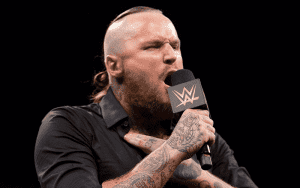Lillian Garcia welcomes Aleister Black to the show.
Black informs that he wrestled on the indies for years as Tommy End. He notes that there are a number of similarities between the two characters, but there are also a number of differences. He thinks the Aleister Black character was a natural progression for him, and it’s almost as if Black emerged through Tommy End shedding his skin and evolving.


He notes that he wasn’t really connecting with fans as the Tommy End character, at least not to the level he wanted to. He started to realize that it was unnecessary to try to be “normal” in this abnormal world of professional wrestling, so the Aleister Black character just felt right to him. The name was developed through a collaboration between himself and Triple H.
Black informs that he was terrified of the dark as a child. He was reading about cults and government conspiracies at the age of 8, and he was scaring himself to death. He had to stop reading about that stuff and started confronting his fear of the dark, and soon he became more comfortable with it. He admits that he’s a recluse now and loves to be on his own.
Black mentions that he has anxiety and struggles with other mental health issues when it comes to interacting with other people. He notes that social media has encouraged a new generation of people to be comfortable with no face-to-face interaction. He doesn’t like that, and he tries to stay off social media as much as possible, especially since the “Black” character probably shouldn’t utilize social media that much anyways.
Black doesn’t consider himself to be the new generation’s Undertaker at all. He points out that there will only be one Undertaker, and there will only be one Aleister Black. They are different people and he’s working to make Black a unique character. He understands that some people compare the characters due to their dark, mystical similarities, but he’d never consider himself to be the next Undertaker.


Black notes that he had a fine childhood, but his family struggled financially. Both of his parents had difficult childhoods of their own and they brought that into their family as well. His father was a very hard working man, but he often refers to his father as his best friend and his worst enemy. He notes that his father is a fantastic human being, but it took him a while to get there.
He informs that being a professional wrestler is everything to him. He was 14 years old when he told one of his teachers that he wanted to be a professional wrestler. She was a huge supporter of his and urged him to make his dreams a reality. School never connected with him and he wasn’t a good student because he just didn’t care about it.
For him, wrestling is about the experience as a whole and not just about winning Championships. However, winning the NXT Title was a victory for him against his mental state. He wanted to make his Title win into a sign of hope for people who are struggling with certain things mentally. He admits that he struggles to take compliments and he never feels like he’s good enough.
His goal moving forward is obviously to become WWE Champion, but his goal is also to continue one-upping himself. He says he’s in no hurry to join RAW or Smackdown, and he wants that transition to take place when it feels necessary. He wants to be in the place where WWE needs him, and if that means he’s called up tomorrow or in a year or two, that’s fine by him.
Black mentions that he still struggles with happiness and he doesn’t love himself yet, but he’s working on it. At a recent therapy session one of his therapists asked him if he’s ever been happy in his life, and it took him 10 minutes to answer the question. He came to the realization that he’s never been truly happy, but he’s working daily to fix that.
That sums up this week’s episode of Chasing Glory. You can listen to the show yourself anytime here, and I’ll catch ya next week for another recap!
